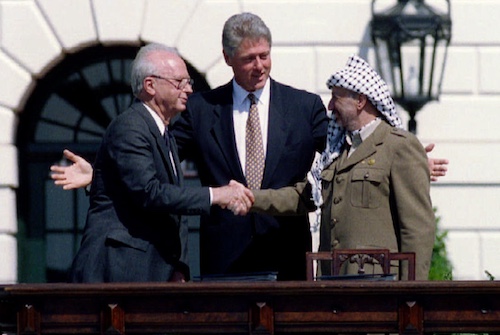Communiqué

How the Israeli-Palestinian peace process was undone by politics and violence in “Shattered Dreams of Peace: The Road from Oslo” on FRONTLIINE – Nov. 7 at 10 pm
< < Back to how-the-israeli-palestinian-peace-process-was-undone-by-politics-and-violence-in-shattered-dreams-of-peace-the-road-from-oslo-on-frontliine-nov-7-at-10-pmFRONTLINE
“Shattered Dreams of Peace: The Road from Oslo”
Tuesday, November 7 at 10:00 pm
As violence between Israelis and Palestinians continues, threatening the stability of the entire Middle East, it is hard to recall the great hopes raised by the Oslo accord in September 1993. Thirty years ago, Oslo was heralded as an historic turning point in Arab-Israeli relations. U.S. President Bill Clinton called Oslo “the dawn of a new era” and “a shining moment of hope for the people of the Middle East — indeed, of the entire world.”
What went wrong?
In “Shattered Dreams of Peace: The Road From Oslo,” FRONTLINE examines the faltering, frustrating quest for peace in the Middle East and chronicles how the peace process begun at Oslo was endlessly threatened, and ultimately undone, by the dynamics of politics and violence on both sides.
With never-before-seen footage of Israeli-Palestinian negotiations and interviews with Shimon Peres, Yasser Arafat, Ehud Barak, Benjamin Netanyahu, Saeb Erekat, and other key figures on both sides of the bargaining table, this two-hour program gives viewers unprecedented access to the decision-making process that has brought Israel and the Palestinians to the brink of all-out war.
 “Shattered Dreams of Peace” begins with the cautious optimism of the Oslo accord. The agreement outlined a number of key concessions to be made by both Israel and the Palestinians. Israel agreed to recognize Palestinian autonomy in the West Bank and Gaza Strip by beginning to withdraw from the cities of Gaza and Jericho — essentially exchanging land for peace. The Palestinians, meanwhile, recognized Israel’s right to exist while also renouncing the use of terrorism and its long-held call for Israel’s destruction.
“Shattered Dreams of Peace” begins with the cautious optimism of the Oslo accord. The agreement outlined a number of key concessions to be made by both Israel and the Palestinians. Israel agreed to recognize Palestinian autonomy in the West Bank and Gaza Strip by beginning to withdraw from the cities of Gaza and Jericho — essentially exchanging land for peace. The Palestinians, meanwhile, recognized Israel’s right to exist while also renouncing the use of terrorism and its long-held call for Israel’s destruction.
Over the following seven years, however, the peace process encountered major setbacks. Perhaps the most devastating occurred in 1995 when Israeli Prime Minister Yitzhak Rabin was assassinated by a Jewish extremist. His murder signaled the growing threat posed by radical nationalist factions among both Jews and Palestinians — groups that opposed all compromise between the two peoples and held profoundly divergent views on everything pertaining to the conflict.
The program recounts how continued Palestinian terror attacks contributed to the defeat of Prime Minister Shimon Peres, Rabin’s successor and a co-architect of Oslo, in Israel’s June 1996 elections. He was replaced by the hawkish Likud Party’s Benjamin Netanyahu, who during the campaign vowed to “prevent the establishment of a Palestinian state [by] the bloody man Arafat.”
“Shattered Dreams of Peace” also examines the U.S. role in the peace process, including the U.S.-brokered negotiations at Wye River in 1998, Camp David in 2000, and the last effort in Taba, Egypt, in 2001.
At virtually every step, the search for peace was undermined by violence. Palestinian extremists launched a new wave of attacks and right-wing Israelis denounced Netanyahu for agreeing to give up territory in the West Bank. In the next elections, Netanyahu was defeated by Israel’s most decorated military hero, Ehud Barak, leader of the pro-peace Labor Party. Barak resolved to find a permanent solution to the Israeli-Palestinian problem.
“It was clear to me that we have to put an end to our reigning [over] another people, that we have a major interest … to have two states for two nations,” Barak tells FRONTLINE.
“Shattered Dreams of Peace” recounts Barak’s attempts to achieve peace not only with the Palestinians but also with neighboring Syria — a move that left Arafat and the Palestinians feeling vulnerable and isolated. At the same time, Palestinians were becoming increasingly alarmed at the continuing expansion of Jewish settlements in the West Bank under the Barak government.
 “[The] Palestinian street began boiling up, boiling up, boiling up, angrier, angrier, angrier and so on,” says chief Palestinian negotiator Saeb Erekat. “Against the peace process, against the Israelis.”
“[The] Palestinian street began boiling up, boiling up, boiling up, angrier, angrier, angrier and so on,” says chief Palestinian negotiator Saeb Erekat. “Against the peace process, against the Israelis.”
In a last-ditch effort to resolve key issues surrounding territory and refugees, Barak asked Clinton to convene a summit at Camp David in July 2000. Despite Clinton’s personal mediation, and an 11th-hour attempt to reach a comprehensive agreement, the summit ended in failure. The Palestinians criticized Barak for coming to the table with a proposal for dividing the West Bank that they had already rejected. In their view, the proposal would deny the Palestinians a workable state; their territory would lack water and good land, would be almost split by Israeli annexation, and Israel would be left with 9 percent of the West Bank.
U.S. and Israeli officials contend, however, that throughout the 10-day summit the Palestinians rejected Israeli proposals while offering no proposal of their own. Publicly, Clinton and Barak blamed Arafat for Camp David’s failure.
“Shattered Dreams of Peace” concludes by following the peace efforts through the start of the Al Aqsa intifada in September 2000, the last desperate negotiations at Taba — where both sides said they came closer to a final agreement than ever before — and the election of hard-liner Ariel Sharon in February 2002.
The program concludes with the crisis of spring 2002 and its escalating violence, hatred, and despair. Nine years after the peace process began, the dreams of Oslo lay shattered, the peace process moribund.

